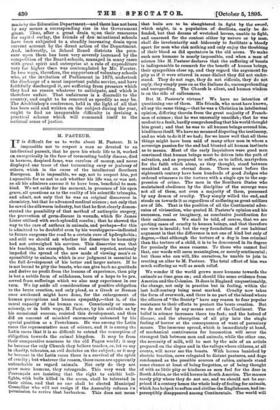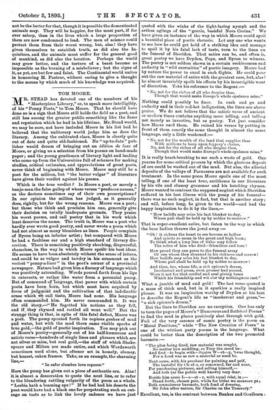M. PASTEUR.
IT is difficult for us to write about M. Pasteur. It is impossible not to respect a man so devoted to an intellectual pursuit, that he gave his whole life to it, worked on energetically in the face of tormenting bodily disease, died in harness, despised fame, was careless of money, and never displayed one trace of that tormenting envy or jealousy of others, which is the curse of the intellectual Southern European. It is impossible, we say, not to respect him, yet impossible for us not to ask whether his life was, or was not, as all his admirers assume it to have been, beneficial to man- kind. We set aside for the moment, in presence of his open grave, all questions as to the reality of his scientific triumphs, and admit, not only that he was an original discoverer in chemistry, but that he advanced medical science ; not only that he saved the silkworm industry, but that he first clearly demon- strated the possibility of that method of antiseptic surgery, the prevention of germ-disease in wounds, which Sir James Lister utilised with such splendid results ; that he showed the way to the cure of anthrax in animals, and perhaps—for this is admitted to be doubtful even by his worshippers—indicated to future surgeons the road to a certain cure of hydrophobia; and still we should ask whether his disservice to humanity had not outweighed his services. This disservice was that his teaching, his example, both real and reputed, seriously impeded the spread of the new mode of viewing man's re sponsibility to animals, which in our judgment is essential to the full development of his better and larger nature. If he is not bound to pity the beasts, who can give back no gratitude and derive no profit from the lessons of experience, then pity is but a subtle form of selfishness, born of a hope to be pre_ served from sufferings which we also may experience in our turn. We lay aside all considerations of positive obligation to the brute creation, and only plead, as a Greek or Roman once awakened might have done, for the enlargement of human perceptions and human sympathy,—that is, of the moral capacity of the human race. Consciously or uncon- sciously, or in both ways, M. Pasteur, by his attitude as by his occasional success, resisted this development, and thus did an amount of mischief enormously enhanced by his special position as a Frenchman. He was among the Latin races the representative man of science, and it is among the Latin races that it is so difficult to extend the conception of obligation towards the animal kingdom. It may be from their comparative nearness to the old Pagan world ; it may be because the only Church they believe teaches, or, let us say in charity, tolerates, an evil doctrine on the subject ; or it may be because in the Latin races there is a survival of the spirit
of cruelty ; but whatever the reason, those races are apparently unteachable as regard animals. Not only do they not grow more humane, they retrograde. This very week the
Provencals are insisting that the right to exhibit bull- fights, with bulls killed in the arena, shall be tolerated in their cities, and that no one shall be elected Municipal Councillor who will not resign if the Assembly refuses its permission to revive that barbariem. This does not mean that bulls are to be slaughtered in fight by the sword, which might, in a population of duellists, easily be de- fended, but that dozens of wretched horses, unable to fight, and unarmed for the contest either by nature or by man, shall die involuntarily and hideously to facilitate a bloody sport for men who risk nothing and only enjoy the throbbing of their blood as did spectators in the old arena. To make such men humane is nearly impossible, and when a man of science like M. Pasteur declares that the suffering of beasts is indispensable to research for the benefit of human beings, their sympathies close up, and they regard the argument for pity as if it were uttered in some dialect they did not under- stand. They do not rage, they do not ridicule, they do not reply, they simply pass on as the Italians do, uncomprehending and unregarding. The Church is silent, and human wisdom is on the side of callousness.
But M. Pasteur's virtues ? We have no intention of questioning one of them. His friends, who must have known, all say the same thing,—that he was a Christian in intellectual opinion, differing therein from the great majority of French- men of science ; that he was unusually unselfish; that he was modest to a fault, hardly comprehending that his world thought him great ; and that he was to all human beings around him, kindliness itself. We have no means of disputing the testimony, and no wish to do it if we had; for we know well that all these things might have been said of many other men in whom a sovereign passion for the end had blunted all human instincts as to means. Most of the early Inquisitors were good men convinced that human beings must be driven into the path of salvation, and as prepared to suffer, as to inflict, martyrdom for the faith which alone, as they thought, stood between mankind and an eternal doom. There must before the eighteenth century have been hundreds of good Judges who ordered witnesses to the torture with a single eye to the sup- pression of crime. The men in the Southern States who maintained obedience by the discipline of the scourge were not all of them, not even a majority of them, possessed by any demon of cruelty. They simply willed the end, and strode on towards it as regardless of suffering as great soldiers are of life. That is the position of all the Continental advo- cates of vivisection, who quoted M. Pasteur's opinion and his successes, real or imaginary, as conclusive justification for their callousness. We shall be told, of course, that we are quoting cases of cruelty to human beings, and that therefore our view is invalid ; but the very foundation of our habitual argument is that the difference is not one of kind but only of degree,—that although the torture of a dog is less criminal than the torture of a child, it is to be denounced in its degree for precisely the same reasons. To those who cannot feel that, our words will seem meaningless, or merely sentimental; but those who can will, like ourselves, be unable to join in erecting an altar to M. Pasteur. The total effect of him was much suffering as well as much relief.
We wonder if the world grows more humane towards the animals as time goes on ; and should like some evidence from America and the Colonies. It does in England unquestionably, the change, not only in practice but in feeling, within the last half-century being most marked. Cruelty now takes the form of overwork, and there is no part of the island where the officers of "the Society" have any reason to fear popular resistance to their efforts to protect the brute creation. But we do not feel by any means sure of the Continent, The belief in science increases there too fast; and the hatred of disease, and the absorption of all pity into the single feeling of horror at the consequences of want of pecuniary means. The immense spread, which is immediately at hand, of mechanical contrivances for locomotion will sever the strongest link between men and animals, while the other one, the necessity of milk, will be met by the sale of an article prepared on the slopes and in the valleys where citizens, at all events, will never see the beasts. With horses banished by electric traction, cows relegated to distant pastures, and dogs condemned as the possible sources of rabies, animals stand some chance at least of being forgotten, or of being thought of with as little pity or kindness as men feel for the deer in South Africa, or the wild horses in South America. The masses rarely pity where they do not see, and we should not be sur- prised if a century hence the whole body of feeling for animals, which has helped to soften and civilise the Englishman, had im- perceptibly disappeared among Continentals. The world will not be the better for that, though it is possible the domesticated animals may. They will be happier, for the most part, if for ever asleep, than in the lives which a large proportion of them are now condemned to lead. The men of science could protect them from their worst wrong, but, alas ! they have given themselves to establish truth, as did also the In- quisitors, and the animals must suffer for the general good of mankind, as did also the heretics. Perhaps the world may grow better, and the torture of a beast become as impossible as the burning of a misbeliever ; but the signs of it, as yet, are but few and faint. The Continental world unites in honouring M. Pasteur, without caring to give a thought to the means by which much of his knowledge was acquired.







































 Previous page
Previous page